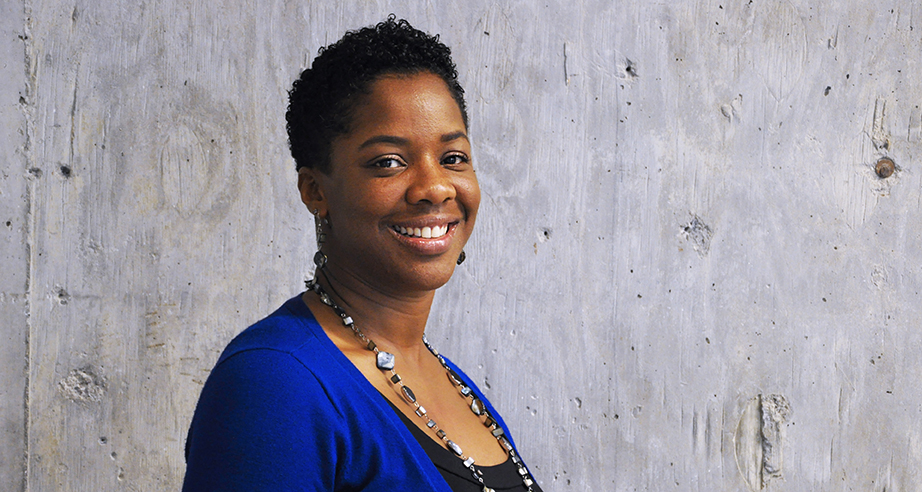
Doctoral student Janille Smith-Colin spends a lot of time on roads.
Sometimes it’s studying them. Sometimes it’s running on them.
Earlier this summer, she and 11 other women ran 196 miles from Madison, Wisconsin, to Chicago (It’s called the Madison to Chicago Ragnar Relay). She ran the famed Peachtree Road Race in Atlanta July 4. And she’s already preparing for the Divas Half Marathon in Peachtree City in September.
 |
|
| The course for the Ragnar Relay Smith-Colin ran with 11 other women this spring. (Map Courtesy of Ragnar Relay.) |
A self-proclaimed “slow runner,” Smith-Colin loves it (you can tell when she talks about it). It’s a sport that demands persistence—the same kind of persistence Smith-Colin also has shown in her educational pursuits.
When she decided to work on her Ph.D., she had to exercise a little of that determination to get the professor she wanted to advise her: Adjo Amekudzi Kennedy.
“Over the years I stalked her,” says Smith-Colin, who’s entering her third year of Ph.D. work in the School of Civil and Environmental Engineering. “I was pretty persistent, because I wanted to work with her.”
Now she does. And it turns out Georgia Tech ended up being a good place to do that work, she says.
“Part of my struggle had always been, do I want [my Ph.D.] in urban planning or do I want it in civil engineering? Georgia Tech, at least the transportation engineering group, has faculty that provide a good balance between the two disciplines.”
Smith-Colin’s love for transportation planning goes back to her childhood, when she traveled extensively with her family and discovered how mass transit opened cities across the world to her.
“I always loved transportation,” she says. “It gave me this independence that nothing else could. I thought it was the coolest thing to be someone who studied, developed, planned and implemented transportation.”
That love for transit blossomed into something bigger when Smith-Colin wrote an undergraduate honors thesis on a toll road in Jamaica, her home country. And after years of working as an engineer for the Florida Department of Transportation, it unfurled even further. Now Smith-Colin wants to do more public policy planning around transportation and help influence the next generation of women engineers.
“In reflection, the people who were most influential to me were the people who taught me,” she says. “I believe strongly that as a role model, as an example, you have maybe the largest impact in the classroom, having a young woman see you and believe that that can be her. I think almost at the professional level it’s too late. Because you go through so much in college that people don’t recover from, self-esteem wise, confidence wise.
“Academia is really a setting where a portion of your time can be devoted to truly harvesting the next generation.”
 |
| (Photo Courtesy of adropp via Flickr.) |
Did it work?
Smith-Colin’s research focuses on performance planning—assessing how well new ideas work after transportation planners try them.
“Because of limited funding, there’s a bigger push to understand how a specific intervention impacts transportation and whether the money was well-spent,” she says.
Those interventions could be new technology, policy changes or new initiatives designed to improve how a community gets around. So she’s looking at how to formalize the process of answering a simple question: Did it work? Did that strategy accomplish what we intended?
“In other countries, they’re taking steps to make [that process] more formal, so I proposed we take a look at that,” Smith-Colin says. She pointed to New Zealand, where certain transportation projects go through an official review about a year after they’re completed.
Award-winning spring
Smith-Colin is getting support for her feedback and assessment research from the U.S. Department of Transportation as an Eisenhower Fellow. It’s just one of a passel of awards she’s collected in recent months.
She’s an Environmental Defense Fund Climate Corps Fellow, one of 100 selected this year. As part of the program, she has spent the summer at Clark Atlanta University helping campus officials develop a Climate Action Plan and find cost savings from energy efficiency.
She attended the Transportation Research Board conference as an International Road Federation Fellow.
She won the CH2M Hill scholarship from the Women’s Transportation Seminar to support her graduate work this year.
And she received that partial Eisenhower Transportation Fellowship from the Federal Highway Administration.
“I’ve always wanted to be an Eisenhower Fellow,” Smith-Colin says. “Last year, I missed the application because a reference didn’t get in, and my heart broke. I was determined this year to get it right. So I’m happy that I got it right.”
Happy—and also determined to win a full fellowship. Smith-Colin says she’s already thinking about next year’s application.
Yeah, she’s persistent.
